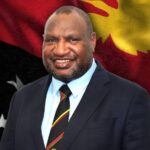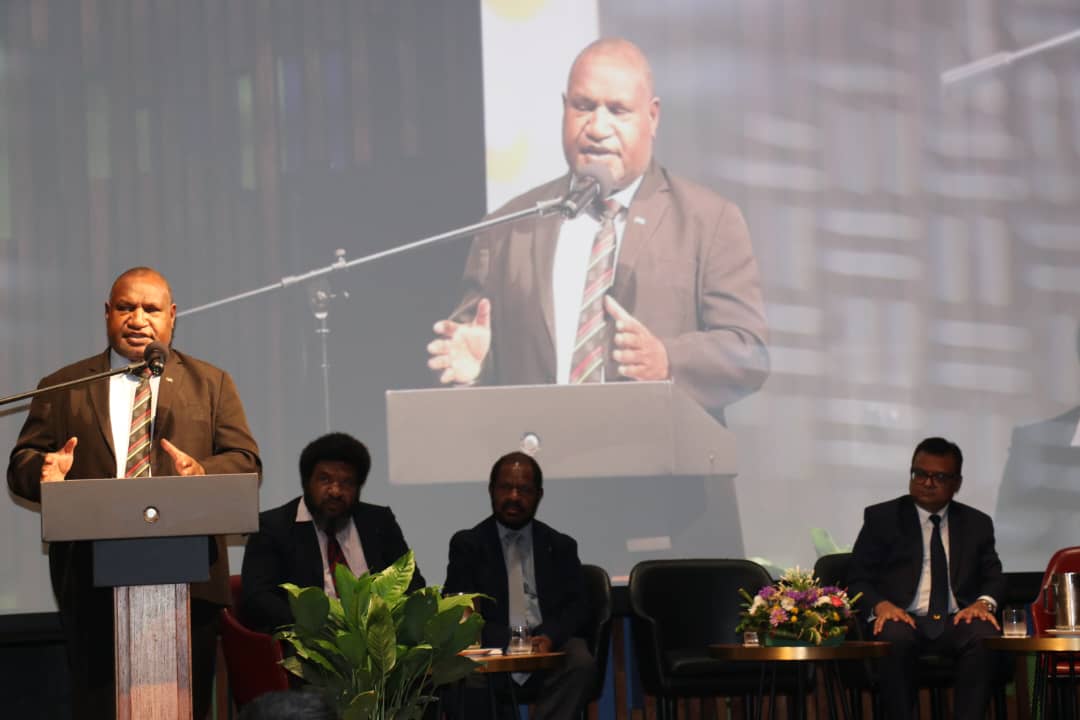Prime Minister James Marape today reaffirmed his government’s commitment to reforming State-Owned Enterprises (SOEs), ensuring they operate efficiently and contribute to economic growth and service delivery. Speaking at the NASFUND FM100 Talkback Show launch, he highlighted partial privatisation as a key strategy to enhance management and improve performance.
Prime Minister Marape acknowledged that the operational environment for SOEs has changed significantly since 1975, and it is no longer sustainable for the government to run these entities in the same way.
“We have been running our SOEs under the public service model for too long,” he said.
“The conditions today are different from those in 1975. Back then, it was about delivering services as a public good. Now, these businesses must be run with efficiency and profitability in mind while still serving the people.”
He outlined the government’s plan to restructure key SOEs, focusing on introducing private sector expertise while maintaining government oversight.
To improve management and financial stability, the government is moving towards a 51%-49% public-private partnership model, where the government retains majority ownership while private investors take control of management and operations.
“We are looking at a model where we retain 51% ownership, while private sector partners hold 49% and manage the operations,” he explained.
“This ensures that the state continues to benefit while bringing in private sector efficiency and investment.”
He invited both local and international investors to express interest in partnering with SOEs, particularly in sectors such as electricity and telecommunications.
“We call on investors—whether you are local, international, or superannuation funds—to take part in these reforms. When you hold 49%, you take management control, while the government remains a shareholder benefiting from dividends and improved services,” he added.
Addressing concerns over PNG Power’s inefficiency and unreliable electricity supply, Prime Minister Marape emphasised that private sector involvement is necessary to stabilise and improve service delivery.
“Power is a critical service, and we must ensure that PNG Power operates at a high standard. This means bringing in private sector expertise to improve management, infrastructure investment, and accountability,” he said.
The proposed reforms will ensure better investment in infrastructure, more reliable electricity supply, and a financially sustainable PNG Power.
The telecommunications sector is also a priority for reform, with Telikom PNG expected to undergo major restructuring to improve service quality, affordability, and nationwide access to mobile and internet services.
“Telecommunications is vital in today’s economy, and we need Telikom PNG to be competitive,” Prime Minister Marape stated.
“We have already merged Bmobile and Telikom PNG, but more work is needed to bring in private sector efficiency and capital investment.”
The government seeks private sector participation to drive faster internet, expanded coverage, and competitive pricing.
Prime Minister Marape pointed to the success of Bank South Pacific (BSP) as an example of how private sector involvement has transformed a state-owned enterprise into a profitable and well-managed institution.
“BSP was once a state-owned entity, but through reforms, it has become a leading financial institution. We need to apply the same principles to our SOEs,” he said.
Under the 51%-49% model, the government remains the majority shareholder, ensuring that SOEs continue to serve national interests while benefiting from private sector expertise and investment.
The government is preparing to launch an Expression of Interest (EOI) process to attract investors and strategic partners.
“We are developing a clear framework for SOE partnerships, and we invite interested parties to be part of this
transformation,” he stated.
The reforms will not only improve service delivery but also create jobs, attract investment, and position Papua New Guinea’s economy for long-term success.
Prime Minister Marape reaffirmed his government’s commitment to SOE reforms as a key pillar of economic growth.
“Our SOEs are vital to our economy. Without reform, they will continue to drain public funds and deliver substandard services. We must change that. By partnering with the private sector, we will ensure efficiency, sustainability, and better services for our people,” he said.
Further announcements on SOE reform policies are expected in the coming months, with the government outlining a step-by-step approach to improving efficiency, service delivery, and financial sustainability.




